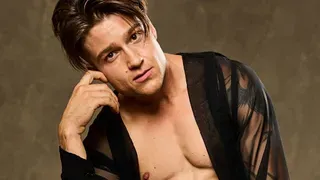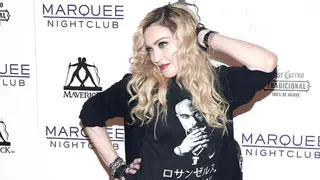April 13, 2022
Meet Queer Working Class Hero, Booker Award-Winning Novelist Douglas Stuart
Billy McEntee READ TIME: 7 MIN.
Queer novels are often celebrated by their own communities long before making a splash – or being accepted – in the mainstream, which may take years and decades. And so it's a rare treat when a novel, particularly a debut, cuts through the noise, offers a narrative as fresh as it is specific, and is met with international acclaim. Such was the case for Douglas Stuart's "Shuggie Bain," an elegiac, gritty, and gorgeous love letter to his native Scotland that took home the 2020 Booker Prize for Fiction, one of the world's top prizes for English novels.�
"Shuggie Bain," also a finalist for the 2020 National Book Award for Fiction, follows the young, titular protagonist who is coming into his queerness while also more firmly understanding the poverty-stricken, vibrant world around him. In advancing how working-class queer stories can be told, Stuart looks backwards: at his own upbringing, at his beloved community, at a society defined by struggle and prejudice. Such are the themes that color "Young Mungo," his second novel that was released on April 5.�
Stuart's novels and short stories spotlight compelling characters who are driven by, and sometimes tragically succumb to, individual aches – ones exacerbated by an oppressive society and that feel as impossible to shake as a tick burrowed in skin. Most uniquely, his works offer, especially for readers of younger generations, a window into how queer people found one another in a pre-Internet time. In creating various stories set around similar settings, Stuart is building a universe of queer Scots, each as lonely as the next, unaware of how near their kinfolk are. "Young Mungo" adds a few new stars to that constellation, and ahead of its highly anticipated premiere, EDGE spoke with Mungo about the stories and people he has always wanted to see celebrated on the page.
EDGE: Hi Douglas! You're someone who's found fame during a rather strange time. Awards and pandemic have collided in your life; what has that been like? What have the past two years been like for you on an internal and external level?
Douglas Stuart: It's been deeply strange, a bit of a mind melt. On one hand, it's a time when we were all so concerned with these really huge things, and on the other hand it was this time of great growth and joy. And yet, as a writer, I always felt a bit on the outside of things. I didn't do an MFA, I didn't have a tight-knit circle of writer friends. At the same time, physically, I remain on the outside – no one knows me, I'm stuck at home. There were some benefits because, emotionally, I was safe at home, I have the support of my husband, but it's also been very exposing because I've also had a lot of strangers coming into my home trying to get to know me.
EDGE: Your new book, "Young Mungo," seems to echo some of your well-known themes and characters: young, queer, working-class Scottish people. Can you set up the new novel?
Douglas Stuart: "Young Mungo" is a book about first love, it's a romance between two young men who are growing up in some of the most deprived housing schemes of the East End of Glasgow, but the men have broken two taboos. The first is to fall in love with one another, and the second is to cross sectarian lines: One of them is Protestant and the other is Catholic. It's a book that explores masculinity, and all the dangers that come from performative masculinity because the other boys around our protagonist want him to be drawn into a world of gang violence, petty crime, sexualization, and our protagonist is an incredibly gentle, tender young man. It's a book that I hope combines romance with horror in a way.
EDGE: Your books feel like the memory plays I associate, lovingly, with Tennessee Williams. They have this episodic but swirling quality. Do you write down your memories? Do they creep up on you? Do you mold their raw emotions into narratives?
Douglas Stuart: I think I'm always dealing with memory and processing trauma. I'm always trying to sort of get to the root causes of things, and I think as an immigrant to the United States I'm always looking back to my childhood with some kind of distance, or homesickness, but a feeling of also trying to process it. Personal lived experience has been important to my writing up until now, but I also find that working-class queer lives are often overlooked. These are the people I grew up around and loved, so I enjoy celebrating that on the page and giving them the space of a novel.
Tennessee Williams really struck me. There is often at the heart of my novels a woman who is disintegrating and who is coming undone, who's trying to maintain a facade that is coming apart. He's been a huge influence of mine. I'm always writing about these new characters who are assembling new families, who are doing their best to belong in the only place they know but where they also know they don't belong.
EDGE: You give characters we don't often see a life on the page, and there's an intersectionality to them – working-class standing, queerness, isolation. How do these themes propel you, and where do you want your writing to go?
Douglas Stuart: As you said earlier about memory plays, there were so many big traumatic things that happened in my youth that I think I'm always discovering or trying to look into those wounds. There's questions of belonging, masculinity, addition, poverty, male violence, sectarianism. These were all things that were interwoven in my own experience, so they fuel me to create my art. I'm often surprised when people say, "Oh, you've written another Glasgow novel," as if Glasgow is not central to my being. To some, clearly, they think of Glasgow or the working class as an "other," whereas to me it is not an "other," it is who I am. In the same way so many writers are fascinated by the people who make us, I cannot think of any deeper inspiration than those who made me. And so my work is moving toward New York and expanding outward, but I'm also trying to create this tapestry of queer lives that are working class. "Shuggie Bain" was a conversation about a community in crisis, just as Pittsburgh or Appalachia or Detroit are also stories of deindustrialized areas. I'm keen to turn this into a tapestry because there's so many lives here that are dignified and are worthy of talking about.
EDGE: You have this stunning short story, your first major published work, "Found Wanting," in The New Yorker. Without spoiling anything, it ends with this beautiful moment of connection between the narrator and a far-off crofter's son – a moment of connection still defined by distance. It said so much about how queer people find each other.
Douglas Stuart: I'm a gay man of a certain age, and my young queer friends nowadays cannot believe that it was possible to grow up with such isolation, but when I was a young man, the only way to find like-minded spirits (and I'm not talking sex, I'm talking about "Hey, you're like me,") was through the back pages of gay papers. I think oftentimes young men maybe in poverty or feeling isolated by their situations don't get to access queer bookstores or bars, and so we reach out in other ways. The character feels so alone in the world. It's a recurring theme because frankly, I felt that way. I felt like the only person on the landscape; the crofter's son is geographically quite far from the protagonist, but they can be connected because they have so much more in common with each other than they do with others around them, and so much of that is the queer experience.
EDGE: You mentioned not doing an MFA, and you come from a number of fashion jobs in the city – how did you balance writing?
Douglas Stuart: I think the answer is I didn't balance it. I didn't always manage to make it work. It took me 10 years to write "Shuggie Bain" and five for "Young Mungo" because I had to fit in writing wherever I could. New York is demanding at the best of times, but fashion in New York is just relentless. The minute you think you've designed the thing of the now, of the moment, the moment shifts. There's no conclusion. So I learned to steal time, I learned to write in my head, on my phone, in the morning, on airplanes, at lunchtime. Sundays were the day I didn't go into the office, so if I'd been carrying a paragraph with me all week, I'd try to set it down on the page. I took it as I could.
EDGE: Have you returned to your native Scotland during the pandemic, and what has the reception been like, specifically from queer Scots?
Douglas Stuart: It's been really incredible. You know the book had its moment around the world, and I was prohibited from going home [due to COVID]. I couldn't see my family or the city the book was set in, and it took a long time before I could go, but the book had been so embraced. The city painted a 40-foot mural to Shuggie Bain outside of one of our most important buildings. Every word in my work is inspired by working-class Glasgow, so to see my words reflected back on that side of the city is really powerful for me. I'm so grateful.
"Young Mungo" is available in bookstores and on Amazon.







